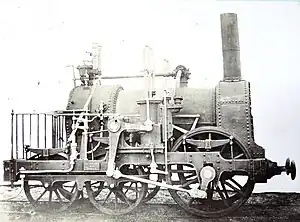Under the Whyte notation for the classification of steam locomotives, 0-2-4 represents the wheel arrangement of no leading wheels, two powered driving wheels on one axle, and four trailing wheels on two axles.
History

Dundee and Newtyle Railway 0-2-4
This is an unusual wheel arrangement, with the only known examples being three locomotives supplied to the 4 ft 6 in (1,372 mm) Dundee and Newtyle Railway by J and C Carmichael of Dundee in 1833.[1][2] These were still in operation in 1847, but may have been scrapped in 1849 when the line was converted to standard gauge. There was also the Bristol and Exter Railway Fairfield Steam Carriage, built in 1848 for the Bristol and Exter Railway, who used it on a branch line before turning it into an 0-2-2.
References
- ↑ Baxter 1977, p. 20.
- ↑ Baxter 1984, p. 20.
- Baxter, Bertram (1977). Baxter, David (ed.). British Locomotive Catalogue 1825–1923, Volume 1: General Summary and Index of Locomotive-Owning Companies. Hartington, Derbyshire: Moorland Publishing Company. ISBN 0-903485-50-8.
- Baxter, Bertram (1984). Baxter, David (ed.). British Locomotive Catalogue 1825–1923, Volume 4: Scottish and remaining English Companies in the LMS Group. Ashbourne, Derbyshire: Moorland Publishing Company.
This article is issued from Wikipedia. The text is licensed under Creative Commons - Attribution - Sharealike. Additional terms may apply for the media files.